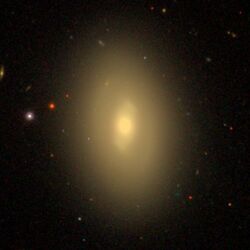Astronomy:NGC 3941
| NGC 3941 | |
|---|---|
 SDSS image of NGC 3941 | |
| Observation data (J2000 epoch) | |
| Constellation | Ursa Major |
| Right ascension | 11h 52m 55.4s[1] |
| Declination | +36° 59′ 11″[1] |
| Redshift | 930 ± 5 km/s[1] |
| Distance | 39 ± 11 Mly (12.1 ± 3.5 Mpc)[1] |
| Apparent magnitude (V) | 10.3 |
| Characteristics | |
| Type | SB(s)0^0^ [1] |
| Apparent size (V) | 3.5′ × 2.3′[1] |
| Notable features | Seyfert galaxy |
| Other designations | |
| UGC 6857, MCG +06-26-051, PGC 37235[1] | |
NGC 3941 is a barred lenticular galaxy located in the constellation Ursa Major. It is located at a distance of circa 40 million light years from Earth, which, given its apparent dimensions, means that NGC 3941 is about 40,000 light years across. It was discovered by William Herschel in 1787.
Characteristics
The galaxy has a counterrotating extended gas disk, which was possibly formed by a galaxy merger of accretion of gas with oppositely directed angular momentum. The disk has low velocity dispersion throughout, which suggests it has settled into equilibrium.[2] The gas is found primarily in two rings. The inner appears almost circular in HI imaging, which may mean it is inclined ~20° or more with respect to the stellar disk, whereas the outer ring has approximately the same ellipticity with the stellar disk. The stellar disk is symmetric and there are evidence of weak spiral arms outside the primary bar.[3] In the infrared Ks-band, the bar has ansae-type morphology and in the inner elliptical there is an inner disc showing two-armed spirals.[4] Based on the fact that the spiral arms and the gas are rotating in different directions it has been suggested that the inner ionised gas and the outer HI gas are inclined, almost perpendicular to the stellar disk. The galaxy features also a secondary bar.[3]
NGC 3941 is type 2 Seyfert galaxy. In the centre of the galaxy lies a supermassive black hole whose mass is estimated to be, based on velocity dispersion, 141 million (108.14) M☉.[5]
One supernova has been observed in NGC 3941: SN 2018pv (Type Ia, mag 12.7).[6]
Nearby galaxies
NGC 3941 forms a small galaxy group with NGC 3930 and UGC 6955, which is part of the Ursa Major Cluster.[7]
References
- ↑ 1.0 1.1 1.2 1.3 1.4 1.5 1.6 "NASA/IPAC Extragalactic Database". Results for NGC 3941. http://ned.ipac.caltech.edu/cgi-bin/nph-objsearch?objname=NGC+3941.
- ↑ Fisher, David (March 1997). "Kinematic Profiles of SO Galaxies". The Astronomical Journal 113: 950. doi:10.1086/118312. Bibcode: 1997AJ....113..950F.
- ↑ 3.0 3.1 Erwin, Peter; Sparke, Linda S. (June 2003). "An Imaging Survey of Early-Type Barred Galaxies". The Astrophysical Journal Supplement Series 146 (2): 299–352. doi:10.1086/367885. Bibcode: 2003ApJS..146..299E.
- ↑ Laurikainen, Eija; Salo, Heikki; Buta, Ronald (1 September 2005). "Multicomponent decompositions for a sample of S0 galaxies". Monthly Notices of the Royal Astronomical Society 362 (4): 1319–1347. doi:10.1111/j.1365-2966.2005.09404.x. Bibcode: 2005MNRAS.362.1319L.
- ↑ Panessa, F.; Bassani, L.; Cappi, M.; Dadina, M.; Barcons, X.; Carrera, F. J.; Ho, L. C.; Iwasawa, K. (31 July 2006). "On the X-ray, optical emission line and black hole mass properties of local Seyfert galaxies". Astronomy & Astrophysics 455 (1): 173–185. doi:10.1051/0004-6361:20064894. Bibcode: 2006A&A...455..173P.
- ↑ Transient Name Server entry for SN 2018pv. Retrieved 5 January 2023.
- ↑ Makarov, Dmitry; Karachentsev, Igor (21 April 2011). "Galaxy groups and clouds in the local (z~ 0.01) Universe". Monthly Notices of the Royal Astronomical Society 412 (4): 2498–2520. doi:10.1111/j.1365-2966.2010.18071.x. Bibcode: 2011MNRAS.412.2498M. http://www.sao.ru/hq/dim/groups/galaxies.dat. Retrieved 2 August 2017.
External links
- NGC 3941 on WikiSky: DSS2, SDSS, GALEX, IRAS, Hydrogen α, X-Ray, Astrophoto, Sky Map, Articles and images
 |

